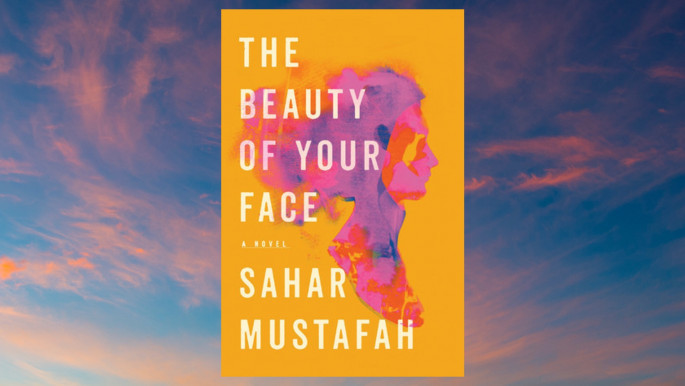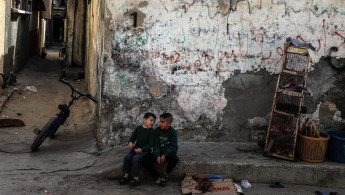Palestinian exile and resistance: There Where You Are Not
Dr Finbarr Barry Flood's introduction to There Where You Are Not, which brings together a vast array of philosophical essays by Palestinian artist and writer Kamal Boullata, is an apt description for a book which traces the history of Palestinian art.
It delves into other philosophical questions from a historical, social, regional and international perspective, juxtaposed against a collection of paintings by the author himself and other Palestinian artists.
As an exile, Boullata offers an incredible glimpse into the experience of history, as a Palestinian, and as the "other".
The book opens with autobiographical reminiscing about Jerusalem and how the Israeli military occupation which commenced in 1967 rendered Palestinians outsiders to their home.
Losing the mundane is what communicates nostalgia, alongside an acute awareness of the danger posed by the Israeli occupation.
Of his early memories of occupied Jerusalem, Boullata writes, "Trespassing through wild shrubs to recover a ball that strayed into what only yesterday was a relative's courtyard now meant risking stepping on a mine or being shot by a sniper."
 |
The book opens with autobiographical reminiscing about Jerusalem and how the Israeli military occupation which commenced in 1967 rendered Palestinians outsiders to their home |  |
Violence permeates throughout the book, both as an experience and as a background against which Boullata embarks upon remembrance.
Israel's erasure of Palestinian villages, the discovery of the mass graves in Jaffa, the assassination of Chilean diplomat Orlando Letelier in Washington, are slivers of memory from which a common theme can be discerned – the human connection to memory and the political scheming of oblivion.
From the point of view of an exiled person, memory becomes intrinsic to one's self. A journey back home when one is away from one's roots.
For Boullata, the participation in Palestine's anti-colonial struggle provided a connection to memory and home.
 |
|
| Read more from TNA's Book Club: The Beauty of Your Face by Sahar Mustafah |
Working on a "Free Palestine" publication with other exiled Palestinians, he described the experience as feeling "at home among outsiders and stateless people like me."
The exile's solitude can be permeated by another exile's experience, working towards a common goal. Boullata's consciousness leads him to develop several projects seeking to unify the Palestinian narrative, including the experience of Palestinian refugee children through their own stories and visual artworks.
Through a discussion of other Palestinian writers' and artists' works, Boullata provides profound insights into Palestine's cultural trajectory.
Scattered as it is, yet bound through origin, Boullata evokes Edward Said's writings to remind the reader that Palestinian narratives are not a linear experience. The history of forced displacement creates a suspension where the exile travels, through memory, from one experience to another.
 |
Working on a "Free Palestine" publication with other exiled Palestinians, he described the experience as feeling "at home among outsiders and stateless people like me" |  |
In terms of artistic narratives and expressions from the colonial occupiers and the colonised, Boullata sheds light on appropriation and its depiction, using the cacti as an example.
For Palestinians, the cacti is a symbol of displacement. Israel appropriated the image as a national symbol. Boullata writes, "For a Palestinian Arab living in Israel, just as the presence of a cactus in nature recalls the absence of a village, the presence of a cactus in a pot recalls its absence from nature."
 |
|
| The book delves into other philosophical questions from a historical, social, regional and international perspective |
In Palestinian refugee camps, children's art took on a different dimension. Boullata recalls the limitations of expressing Palestine, while the art remained rich in historical memory due to the tradition of oral narratives, through which children are taught about Palestine and nostalgia.
Art, Boullata writes, proceeds through three distinct stages: assimilation, remembrance and awakening. While the book traces Palestinian art history back to the 5th century, Israel's establishment contributed not only to loss in terms of archival memory, but also the dispersal of Palestinian artists, who worked in isolation with little opportunity to work together in the earlier years of exile.
Perhaps a growing awareness of dissociation, as described by Boullata, constitutes an important point to ponder. Art is a form of belonging, and belonging is being destroyed by a lack of connection to history. Collective memory in art, Boullata writes, "relied entirely on its capacity to pictorially communicate a narrative expression."
The book also delves into the intersectionality between cultures and how these influenced each other.
Europe's influence on Palestinian arts, and the Arab world's influence on European artists are discussed at length, alongside other critiques regarding collective memory, politics and poetics, feminism, the female artist in Palestinian society, globalisation and other subjects, which are too vast to include in a review.
Indeed, the book lends itself to several readings and re-readings, in order for the writer to absorb the profound thinking behind Boullata's writings.
A journey of learning and introspection, rather than a daunting read, the book is by no means an easy read. Yet Boullata's use of language, poetic and detailed, entices the reader to pursue this dearth of knowledge, passionately written, yet with clarity and focus.
It is an invitation to step away from what the mind thinks it knows, particularly when it comes to the Palestinian experience, to delve into the exile's narrative, for an understanding of the many facets of home.
Ramona Wadi is an independent researcher, freelance journalist, book reviewer and blogger specialising in the struggle for memory in Chile and Palestine, colonial violence and the manipulation of international law.
Follow her on Twitter: @walzerscent
The New Arab Book Club: Click on our Special Contents tab to read more book reviews and interviews with authors:
 |



